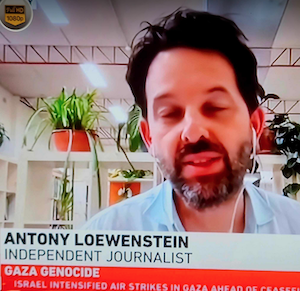
Orientation
The emergence of a strange, secular god
“I am the Lord Thy God, Thou Shalt not have strange gods before me” is not just a religious commandment. Every nation-state expects their citizens to give up or subordinate their regional loyalties, their class, their ethnicity and even their religion to this new god. If we could tell any culture in the world before the 18th century that we nationalists are willing to give our lives to fight strangers in a land we have never seen, they’d say we were crazy. I am a US citizen by birth, Italian by heritage, living in the state of Washington. But I am expected to feel more loyalty to someone who is English, living in North Carolina because they also live in the US. I am expected to feel more loyalty there than I would be to a fellow Italian living in Genoa.
People living in tribal societies would think we nationalists have lost our reason. It took a very heavy duty propaganda machine lasting over 300 years to make us loyal nationalists. This article and the next two explain how this process occurred.
Questions about nationalism, nations, and ethnicity
Nationalism is one of those words that people immediately think they understand, but upon further questioning we find a riot of conflicting elements. There are three other words that are commonly associated with nationalism that are used interchangeably with it: nation, state, and ethnicity. But these terms raise the following questions:
- What is the relationship between nationalism and nations? Were there nations before nationalism? Did they come about at the same time or do they have separate histories? Can a nation exist without nationalism? Can nationalism exist without a nation? Ernest Gellner (Nations and Nationalism) thinks so.
- What is the relationship between a state and a nation? After all, in the premodern world there were primitive states such as Egypt and Mesopotamia that were not nations. On the other hand there were nations within larger polities (like Poland) that were without national sovereignty and part of empires.
- What about the relationship between a state and nationalism. Can states exist without the flag of nationalism? When were national flags introduced? Can people be nationalistic without having their own state?
- What is the relationship between ethnicity and a nation? Can one be part of an ethnic group and not have a nation? Can one be a part of a nation without being in an ethnic community?
- When did nations emerge? The school of primordialism argues that nations emerge early in human history and must have an ethnic core. This group of scholars are called primordialists. Modernists claim that nations come later in European history, anywhere from the 12th to the end of the 18th century,
There is rich scholarly work in this field and most agree that nations, nationalism, ethnicities, and states are not interchangeable. [1] Despite scholars’ differences around the questions above, they agree that nationalism as an ideology arose at the end of the 18th century with the French Revolution. Since our purpose is to understand nationalism, not nations or ethnicities, we are mercifully on safe ground to limit our discussion to nationalism.
Tumultuous Times
It is tempting to think that since the Western individualism that we live under today rejects loyalty to the village, kinship group, or region, individualism was against any social commitment outside of short-term contractual relations. After all, by the end of the 18th century, the world was changing rapidly. Agricultural capitalism was undermining the last vestiges of village life in feudal Europe, while the Enlightenment cosmopolitanism saw loyalty to local communities as being superstitious and backward as it hammered away at traditional religious beliefs. The Industrial Revolution was emerging in England, cutting former peasants and artisan cities from their village roots.
In 1789 France was the scene of the first modern revolution. Between 1789 and 1793 merchants, together with artisans in Paris and peasants in the countryside, had risen against the king and the aristocracy. It was the first time large masses of people had entered a stage of history. However, in these unstable times, some sort of regularized social order was necessary. What came out of the French Revolution provided for a new, non-blood community of individualists – nationalism. The “nation” stands in a tension-filled spatial crossfire between a cosmopolitan globalization of capitalism on the one hand and subnational regional or local identities of collectivism on the other. This community, or “The God of Modernity” as Josep Llobera (1994) claims, is nationalism.
Elements of Nationalism
Four sacred dimensions of national identity
In his wonderful book Chosen Peoples, Anthony D. Smith defines nationalism as an ideological movement for the attainment and maintenance of three characteristics: autonomy, unity and identity. Nationalism has elite and popular levels. Elite nationalism is more liberal and practiced by the upper classes. Popular nationalism is more conservative and practiced by the lower classes.
According to Smith, the four sacred foundations for all nations are a covenant community, including elective and missionary elements; a territory; a history; a destiny. A major concept of Romanticism that helped develop nationalism was the “cult of authenticity”:
At the center of the nationalist belief systems stands the cult of authenticity, and the heart of this cult is the quest for the true self. Authenticity functions as the nationalist equivalent of the idea of holiness in many religions. The distinction between the authentic and the false or inauthentic carries much of the same emotional freight as the division between the sacred and the profane. And, just as the sacred things are set apart and forbidden, so authentic nationals and national objects are separated and venerated. (Chosen Peoples, p. 38)
The fourth sacred source of nationalism – destiny – is a belief in the regenerative power of individual sacrifice to serve the future of a nation. In sum, nationalism calls people to be true to their unique national vocation, to love their homeland, to remember their ancestors and their ancestors’ glorious pasts, and to imitate the heroic dead by making sacrifices for the happy and glorious destiny of the future nation.
Core doctrine of nationalism
These four dimensions of sacred sources in turn relate to the core doctrine of the nation, which Smith describes as the following:
- The world is divided into nations, each with its own character, history and destiny.
- The source of all political power is the nation, and loyalty to the nation overrides all other loyalties.
- To be free, every individual must belong to a nation.
- Nations require maximum self-expression and autonomy.
- A world of peace and justice must be founded on free nations.
Phases of Nationalism
Most scholars agree that nations are a necessary but insufficient criterion for nationalism. While most agree that nationalism did not arrive until the end of the 18th century, almost everyone agrees with the following phases of nationalism:
- Elite nationalism—This first nationalism emerged with the middle classes and used language studies, art, music and literature to create a middle-class public. The dating of this phase varies depending on the European country and ranges from the early modern period to the Middle Ages.
- Popular nationalism—A national community took the place of the heroes and heroines who emerged with the French Revolution. This nationalism was political and was associated with liberal and revolutionary traditions. This phase is roughly dated from 1789 to 1871.
- Mass nationalism—This nationalism was fuelled by the increase in mass transportation (the railroad) and mass circulation of newspapers. It also became associated with European imperialism and argued that territory, soil, blood and race were the bases of nationalism. This last phase of nationalism was predominant from 1875 to 1914.
In the second and third phases of nationalism, rites and ceremonies are performed with an orchestrated mass choreography amidst monumental sculpture and architecture (Mosse, 1975). We will cover each of these phases in more detail as we go.
We said earlier that due to the Industrial Revolution, among other things, individualists began to sever their ties to ethnicity, region, and kinship group as capitalism undermined these identities. By what processes were these loyalties abandoned while a new loyalty emerged? The new loyalty is not based on face-to-face connections, but rather is mediated by railroads, newspapers, books. This is a community of strangers whose loyalty to the nation is not based on enduring, face-to-face engagements. As we shall see, states create nationalism by two processes: first by pulverizing the intermediate relationships between the state and the individual and second by bonding individualists to each other through loyalty to the nation forged by transforming religious techniques into secular myths and rituals.
The Primitive Accumulation of Nationalism: Evolution of States
What is nationalist accumulation?
In Karl Marx’s description of the evolution of capitalism, he describes its first phase as “the primitive accumulation of capital”. By this he means the violent process by which peasants are driven from their land, separated from their tools, cattle, horses and farm products, and then with nothing left to sell but their labor, are forced to work in the factories of capitalists. This primitive accumulation process is then glossed over by Adam Smith and other capitalist economists who create a sanitized version of capitalism’s origins which more closely resembles mythology than history.
This section shows the primitive accumulation of nationalism. We shall discuss the origins of nationalism based on wars between states, wars within states and their own populations, the manipulation of religious techniques to serve the purposes of states’ own purposes, and the propagandization of the state’s own population in order to bind and sustain popular loyalty.
European Systems of States
Before we discuss nationalism further, we need to do a bit of work in disentangling the relationship between states and nations. Since they each have separate histories before they were joined at the end of the 18th century into what Charles Tilly calls “national states”, we will start with states.
Tilly (1992) defines states simply as:
- politically centralized institutions;
- independent from households, kinship groups, economic associations and clubs;
- functioning to steer social policy and maintain public order;
- monopolizing control by means of violence; and
- ruling over a designated piece of land.
Tilly notes that Europe, unlike Asia, has never been dominated by a single empire. In Europe, after the fall of the Roman Empire, the fragmented nature of Western societies allowed emerging states to develop autonomously and to compete with one another. Because no state was very powerful, these states were closer to being equal, and this equality fueled military innovation. These innovations helped build centralized powers that out-competed other kinds of states, such as city-states and empires. States were able to achieve this not only because they assembled standing armies, as opposed to using mercenaries, but because they pacified their domestic population.
While the Muslim, Byzantine, Ottoman and Mongol empires tried to incorporate Europe into their folds, nothing was successful. What arose in Europe instead were regional hierarchies based on trade and manufacturing that maintained an edge over an interstate rule’s imposition. What also arose was a system of states. This means that states regularly interact. Their anticipated interaction affects the policies of every state in a way that, in most cases, deters violence. In contrast, in Asia there was no system of states or recognition of an interstate system; kingdoms and empires simply rose and fell. The merchant class never got out from under the emperor.
Absolutist States
During the feudal Middle Ages, centralized political power was weak. Real political power was in the hands of local aristocrats and the Catholic Church. But as merchants rose in the towns to challenge aristocratic rule, they also formed alliances with kings who wanted to build up a more centralized state. Under the resulting agreements merchants funded standing armies, thus building a centralized state apparatus, in exchange for state protection of merchant long-distance trade.
Centralized State Against Localities and Intermediate Organizations
Absolutist states in Europe didn’t emerge out of nothing. According to Tilly, they emerged out of kingdoms, empires, urban federations, and city-states and had to compete with them for allegiance. In feudal times, local authorities could match or overwhelm state power. This slowly changed as the state centralized power.
In their battles against these other political forms, states learned hierarchical administration techniques from churches that had hundreds of years of experience holding together the sprawling kingdoms of Europe, beginning with the fall of the Roman Empire and throughout the early, central, and high Middle Ages. In order to command obedience, the absolutist state had to break down the local self-help networks that had developed during the feudal age and among those states that became empires.
The state’s strategies and enactments included setting taxed farmers against poor peasants and artisans, forcing the sale of animals in exchange for taxes, imprisoning local leaders as hostages to ensure the community’s payment of overdue taxes, turning mercenaries returning from wars on a civilian population, and conscripting young men who had been their parents’ main hope for comfort in old age. What stood in the way of state centralization were the clergy, landlords, and urban oligarchies who allied themselves with ordinary people’s resistance to state demands.
On the positive side, Tilly reports that homicide rates in the 16th and 17th centuries were half that of the 13th century. The state’s disarmament of civilians took place in small steps, such as through the following tactics:
- Seizure of weapons at the end of rebellions
- Prohibition of duels
- Control over the production of weapons
- Introduction of licensing for private arms
- Restriction of public displays of armed force
- Elimination of fortress-castles
To gain revenue for wars, early states had slim pickings for squeezing tribute and rent from their populations. But as the monetary economy spread and credit became available, it became possible for the state to receive payments from flows such as exercise customs, tolls, stocks (e.g., property), and land tax.
Dividing and conquering intermediaries
Early modern popular allegiances of culture, language, faith and interests did not neatly overlap with centralized political boundaries. States played a leading role in determining who was included and who was excluded in their jurisdictions. This would force people to choose whether they wanted to live in a state where they would, for example, become a religious or cultural minority. Furthermore, the state can play its cultural, linguistic, and religious communities against one another by first supporting one and then switching to support another.
It may seem self-evident that absolutist states would try to join and expand whatever local identity a people had, such as the Basques or the Catalans in Spain. However, this was not initially the case. A local identity was interpreted as a threat just like any other non-state identity—region, ethnic group, or federation—because it competed with the state for people’s loyalty. It was only later when states were out of cash and desperate for manpower that they began trying to manipulate these outside loyalties by promising citizenship and later education in exchange for taxes and conscription.
Sociologists and social psychologists demonstrated that among a group with internal conflicts the best way to forge unity is to present them with a common group enemy. An individual’s group loyalty is solidified by discrimination against an outside group. A scapegoat is selected because it is present, visible, powerless to resist, and useful for displacing aggression.
Building a centralized nervous system: postal networks and newspapers
States reduced barriers between regions by developing roads and postal systems. In the late medieval world, the emergence of private mercantile networks enabled postal communication (Starr, 2004). In the 15th and 16th centuries, private postal networks were built. In France, the postal system was created as early as the late 1400s, and England’s came about in 1516. They expanded until they linked together much of Europe, employing 20,000 couriers. Turnpike construction upgraded routes from major centers to London. From the second half of the 18th century, the postal network offered regular service between regions as well as into London. By 1693 in the United States regular postal service-connected Philadelphia, New York and Boston, and the comprehensive postal network assured postal privacy. The network of US postal systems came to exceed that of any other country in the world and was a way to bring the Western frontier under the umbrella of the Northern industrialists in their struggle against the agricultural capitalists of the South.
Postal networks supported the creation of news networks intended for bankers, diplomats and merchants. They contained both the prices of commodities on local markets and the exchange rates of international currencies. Newspapers also helped centralize and nationalize American colonies by pointing to commonalities across regions. For example, the Stamp Act led to the first inter-colonial cooperation against the British and the first anti-British newspaper campaign.
State vs religion conflicts
In spite of what they learned from ecclesiastical hierarchies about organization, the state and the Catholic church were opposed to each other. The church was an international body that had a stake in keeping any state from competing with it for power. Before the alliance between merchants and monarchs, the Catholic church played states off of one another. One event that began to reverse this trend was the Protestant Reformation. Protestant reformers may not have been advocates for the national interests of Germany, Switzerland, Holland, or England, per se, but they were against the international aspirations of the Catholic church. Protestant leaders like Wycliffe and Hus called for the use of vernacular (local language) rather than internationalist Latin in religious settings. The Protestant religions became increasingly associated with either absolute monarchies or republics (e.g., the Dutch).
The Treaty of Westphalia in 1648 helped end one hundred years of religious wars, and there was an expectation among internationalists that Catholics and Protestants would choose separate countries. According to Llobera (1994), this helped cement the legitimacy of the state. Religious dissidents caught in the wrong country—Catholics in England; Jews, Muslims or Protestants on the Iberian Peninsula; or the Huguenots in France—were seen as potential enemies of the state.
In his book Faith in Nation, Anthony Marx argues that one of the ways the state gained the upper hand over religion was to play religions off of one another within the political boundary. In order to organize support for themselves, states commanded loyalty from their subjects by scapegoating minority religious populations. Anthony Marx argues that state unity was not achieved simply and peacefully through an expanding homogenization process carried out through newspapers, railroads, or common political affinities. The actual process was a divide-and-conquer strategy that lasted for two hundred years.
Anthony Marx takes issue with the notion that a vital part of national identity is in remembering the great deeds of the nation. He says that it is more important for a subject or citizen to forget. This means developing a collective amnesia about past religious massacres and civil wars. In contrast to Enlightenment-era liberal interpretations that national loyalties should be based on citizenship and democracy, which come to replace religious superstitions, Marx says that the state is founded on religious intolerance. Strangely, citizenship and democracy have their roots in exclusion and the amplification of majority–minority conflicts.
National states
According to Tilly (1992), state activities involve a minimum of three processes:
- State making—attacking and checking competitors and challengers within the territory claimed by the state
- War making—attacking rivals outside the territory claimed by the state
- Protection—attacking and checking rivals of the rulers’ principle allies, whether inside or outside the territory claimed by the state
According to Tilly, national states separated themselves from absolutist states creating the following additional functions upon their subject populations:
- Adjudication—authoritative settlement of disputes
- Distribution—intervention in the allocation of goods
- Production—control of the creation and transformation of goods and services
Nationalism in the 19th Century
In the West, when we think of nationalism today, we might imagine right-wing racists and flag-waving war mongers. That is certainly a popular image that began in the last decades of the 19th century, but not before then. After all, the breakdown of intermediate organizations—regional, ethnic, and kin—was opposed by conservatives in the name of religious and aristocratic “tradition.” Hobsbawm (1983) says that what we weakened by modernization was:
- the legitimacy of dynasties, which crossed states;
- the divine ordination of states (kings were understood to be holding a spiritual office);
- the historical right to continuity of rule without a political monitoring process (no input from the middle and lower classes); and,
- religious cohesion across territories.
In the 19th century, we can identify three phases of nationalism and, interestingly, nationalism becomes more right wing only at the end of the 19th century. The three phases are:
- patriotism and early nationalism (1789–1848);
- liberal nationalism (1848–1871); and,
- right-wing imperialistic nationalism (1871–1914).
Patriotism from 1789 to 1948
According to Viroli (2003), there was a long-standing patriotic tradition that was based on the republican forms of government that date all the way back to the Romans, the Italian city-states, and the Dutch cities founded on the presence of political institutions, especially constitutions. The English, American and French revolutions were fought over loyalty to political freedom from the church and crown. While initially championed by the upper and middle classes, patriotism then spread to the lower classes after the French Revolution and the Italian nationalist movement of Mazzini.
For patriots, unlike later right-wing nationalists, ethnicity, history, language, landscape and blood elements were irrelevant for consolidating loyalty. Loyalty to country was created through the political choice of its members. It did not draw inspiration from the past but imagined itself as a model for future societies. In the first half of the 19th century, patriotism was inseparable from the middle and working classes. Nationalism became more radicalized in the 1830s and 1840s, becoming associated with the working classes and the poor. Hobsbawm (1990) says class consciousness had a civic, national dimension.
Liberal nationalism (1848-187)
According to Hobsbawm, the number of nation-states was small in the early 19th century. Before the second half of the 19th century, there were nations without states and states without nations. Nations existed within states and across states. For example, the French saw no contradiction in electing Thomas Paine, an Englishman, to its national convention. To the extent that progressives identified with the emergence of newspapers, urbanization, and centralized transportation, nationalism went with republicanism and liberalism.
The 19th century revolutions in transport and communications typified by railways and telegraph tightened and routinized the links between central authority and its remotest outposts. Rural people were brought into the loop through gendarmes, postmen, policemen, school teachers, garrisons of soldiers and military bands. The state kept records of each of its subjects and citizens through the device of regular periodic censuses. Census did not become general until the middle of the 19th century. This included records of births, marriages, death. (Hobsbawm, 1990)
Mercantilists wanted to promote national economic development. For example, Alexander Hamilton aspired to unite the nation with the state and the economy by founding a national bank. The national bank assumed national responsibility for the debts of local states and protected national manufacturers through high tariffs. These measures were also intended to develop the seed of national awareness among citizens.
Between 1848 and 1880, in practice, there were four criteria that allowed a people to be firmly classed as a nation. It had:
- sufficient size to pass the threshold in the number of people under its banner
- a historic association with a current state that could claim a fairly lengthy past (for example, the existence of English, French, Russian, or Polish nations);
- a long-established cultural elite, possessing a written national literary and administrative vernacular; and,
- the capacity for conquest (Hobsbawm says there is nothing like an imperial power to make a population conscious of its collective existence).
As the poor and working classes increased in emerging or expanding European cities, they built a new force to be reckoned with: unions. From the point of view of the state, citizens were no longer subjects and their consent had to be negotiated.
Political membership in a nation was the emulsifier that bound the state to its citizens, with the promise of democratization in the name of the nation as a way states could acquire legitimacy in citizens’ eyes.
In the last half of 19th century, democratization, unlimited electoralization of politics was unavoidable. It was a new covenant, a civic loyalty, a civic religion that could hopefully out-compete not only traditional loyalties but newly developing class loyalties of the working class. In exchange for the vote, citizens could now be recruited for military duty. By the 1850s as socialism was joined to the union movement, the left gradually became associated with internationalism and while nationalism was taken over by the right wing. (Hobsbawm, 1989)
Right-wing, imperialistic nationalism (1872-1914)
Increasing tensions between nations, classes, religions and ethnic groups
The political unification of Germany in 1871 and its rapid industrialization changed the balance of power in relation to England, France and the United States. In the United States, there were five economic panics (1819, 1837, 1857, 1873, and 1893), which undermined the trust of capitalists in Europe. The result was a protectionist economic foreign policy in all major countries except England. National tariffs allowed for building up home industries rather than having those industries compete internationally.
At the same time that there was political concentration within states, these same states looked to expand their territories through colonization. Italy attempted to expand into Eritrean Somaliland and Ethiopia, the Russians expanded into Turkistan and the frontiers of China, and the United States annexed Hawaii and part of Samoa and forcibly acquired Puerto Rico and the Philippines.
As national states were consolidating their power, a growing number of ethnicities within these national states were fighting either for their independence or for more rights within these states. These included the Irish against the British, the Breton, Flemish, and Corsicans against the French, the Finns, Lithuanians, and Ukrainians against the Russians, the Basques and Catalans against the Spanish, the Czechs, Serbs, Slovaks, and Romanians against the Austrian-Habsburg Empire, and the Norwegians against the Swedish. As Marxists have long pointed out, there was no more effective way of diverting the class struggle between workers and capitalists than to point to other races, other religions, or other nations as the sources of their problems.
The economic instabilities at home that drove capitalists to seek new markets resulted in colonial rivalries. There was war between England and the Dutch (Boer War) between Italy and Turkey; between Russia and Japan in 1904, between China and Japan, and between the United States and Spain in 1898.
Increasing economic disruption also saw the rise of religious intolerance in France, Germany, Russia and the United States. The French state encroached on the functions and rights of the Catholic Church when no more religious instruction was allowed and the Jesuits were banned. In Germany, by the mid-1880s, the Jesuits were also banned.
The rise of unions, socialism, and the Paris Commune threatened capitalist profits from below. This led to an “open door” policy among the heads of state, who would import cheap foreign labor to undermine the increasing demands of local workers. The mass migrations between 1880 and 1914 from Eastern Europe to Western Europe threatened the livelihood of local workers and made them more susceptible to nationalism.
Lastly and paradoxically, the freeing of the slaves in the United States in 1865 led to an increase of racial ideology in the United States. There was soft coercive assimilation of “the melting pot” ideology directed at Eastern Europeans. After the Civil War, the North attempted to paper over their basic economic differences with the South by using the increased hatred of blacks by whites in the South to unite the North and the South by appealing to a white racial nation. But racism was not limited to the United States. In Europe there was a Social Darwinist interpretation of the origin of races: in England Chamberlain), France (Gobineau), and Germany (List).
Novel characteristics of right-wing nationalism
According to Hobsbawm (1990), nationalism between 1880 and 1914 differed in four major respects from the earlier patriotic criteria for nations:
- There was the abandonment of the threshold principle of the 1830s. This meant that a body of people who considered themselves a nation could claim the right to self-determination, meaning they had the right to separate as a sovereign, independent state with their own territory.
- Ethnicity and language became central criteria for nationalism. This was partly a reaction to increasingly massive geographical migrations of people.
- There was the presence of race ideology of social Darwinism, which treated nations as organisms where only the fittest survive.
- There was a sharp shift to the political right, away from republican inclusion and political principles of the Enlightenment and towards an imperial expansionist outlook.
Building nationalism is not just a political and economic process. In France, Britain, the United States and Germany, nationalist clubs sprang up along with fraternities, national holidays, the invention of flags, national anthems, and monuments (Mosse 1975). In the United States, original motivation for public schools was less for learning and more as hothouses for civic patriotic propaganda. They included flags outside of school houses along with pledges of allegiance (O’Leary, 2000).
Conclusion
While individualism rose in the West by the 12th century, the European political development — including political representation and the rise of capitalism — required another kind of community to house these individualist selves. This was a community that was not based on clans, kinship, regions, ethnicities or cities. It was based on loyalty to a state. In part because this was a new political institution, it took hundreds of years to convince its population to be loyal to it. We said that primitive accumulation of nationalism consisted of two parts: first pulverizing intermediate loyalties while building a centralized nervous system: postal networks and newspapers. However we have said nothing about the propaganda techniques used and the social-psychological techniques used to grow that loyalty. Religion and nationalism mostly seem to be opposed to each other. But in my next article I will describe how nationalist drew from the same religious techniques Christian monotheists use to win their populations over.
The post
Nationalism as the Religion of the Modern West first appeared on
Dissident Voice.
This post was originally published on Dissident Voice.















 Loewenstein warned in his book before the conflict began that “an Israeli operation might be undertaken to ensure a mass exodus, with the prospect of Palestinians returning to their homes a remote possibility” (p. 211).
Loewenstein warned in his book before the conflict began that “an Israeli operation might be undertaken to ensure a mass exodus, with the prospect of Palestinians returning to their homes a remote possibility” (p. 211).

